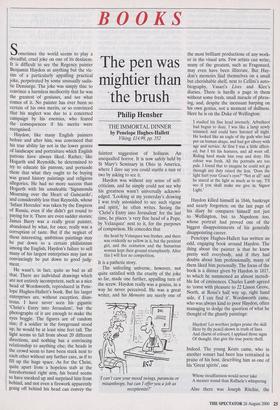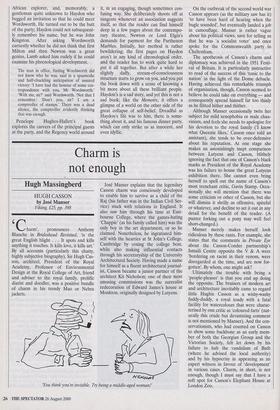BOOKS
The pen was mightier than the brush
Philip Hensher
THE IMMORTAL DINNER by Penelope Hughes-Hallett Viking, £14.99, pp. 352 Sometimes the world, seems to play a dreadful, cruel joke on one of its denizens. It is difficult to see the Regency painter Benjamin Haydon as anything but the vic- tim of a particularly appalling practical joke, perpetrated by some unusually sadis- tic Demiurge. The joke was simply this: to convince a harmless mediocrity that he was the greatest of geniuses, and see what comes of it. No painter has ever been so certain of his own merits, or so convinced that his neglect was due to a concerted campaign by his enemies, who feared the consequences if his merits were recognised.
Haydon, like many English painters before and after him, was convinced that his true ability lay not in the lower genres of landscape and portraiture which English patrons have always liked. Rather, like Hogarth and Reynolds, he determined to try to educate his patrons, and persuade them that what they ought to be buying was grand history paintings and religious allegories. He had no more success than Hogarth with his unsaleable `Sigismonda Mourning over the Heart of Guiscardo', and considerably less than Reynolds, whose `Infant Hercules' was taken by the Empress of Russia, even if she didn't get round to paying for it. There are even sadder stories; James Barry was a really great painter, abandoned by what, for once, really was a corruption of taste. But if the neglect of these interesting, ambitious paintings may be put down to a certain philistinism among the English, Haydon's failure to sell many of his largest enterprises may just as convincingly be put down to good judg- ment.
He wasn't, in fact, quite as bad as all that. There are individual drawings which are not entirely incompetent, such as a nice head of Wordsworth, reproduced in Pene- lope Hughes-Hallett's book. But his larger enterprises are, without exception, disas- trous. I have never seen his gigantic `Christ's Entry into Jerusalem', but the photographs of it are enough to make the eyes boggle. The figures are of random size; if a soldier in the foreground stood up, he would be at least nine feet tall. The light seems to fall from about 20 different directions, and nothing has a convincing relationship to anything else; the heads in the crowd seem to have been stuck next to each other without any further care, as if to fill up the huge space. As for the Christ, quite apart from a hopeless stab at the foreshortened right arm, his beard seems to have sneaked up and surprised him from behind, and not even a firework apparently going off behind his head can convey the faintest suggestion of holiness. An unequalled horror. It is now safely held by St Mary's Seminary in Ohio in America, where I dare say you could startle a nun or two by asking to see it.
Haydon was without any sense of self- criticism, and he simply could not see why his greatness wasn't universally acknowl- edged. 'Looking at my yesterday's drawing I was truly astonished to see such vigour and spirit,' he often writes. Seeing the `Christ's Entry into Jerusalem' for the last time, he places 'a very fine head of a Pope, by Velazquez' next to it, for the purposes of comparison. He concedes that
the head by Velazquez was fresher, and there was evidently no yellow in it, but the penitent girl, and the centurion and the Samaritan woman kept their ground triumphantly. After this I will fear no competition.
It is a pathetic story.
The unfeeling universe, however, not quite satisfied with the cruelty of the joke so far, made one further, appalling turn of the screw. Haydon really was a genius, in a way he never perceived. He was a great writer, and his Memoirs are surely one of I can't cure your mood swings, paranoia or misanthropy, but can I offer you a job as receptionist?' the most brilliant productions of any work- er in the visual arts. Few artists can write; many of the greatest, such as Fragonard, may even have been illiterate. But Hay- don's memoirs find themselves on a small but cherishable shelf, next to Cellini's auto- biography, Vasari's Lives and Klee's diaries. There is hardly a page in them without some fresh, small miracle of phras- ing, and, despite the incessant harping on his own genius, not a moment of dullness. Here he is on the Duke of Wellington:
I studied his fine head intensely. Arbuthnot had begun to doze. I was like a lamp newly trimmed, and could have listened all night. He looked like an eagle of the gods who had put on human shape, and had got silvery with age and service. At first I was a little affect- ed, but I hit his features, and all went off. Riding hard made him rosy and dozy. His colour was fresh. All the portraits are too pale. I found that to imagine he could not go through any duty raised the lion. 'Does the light hurt your Grace's eyes?' Not at all': and he stared at the light as much as to say, 'I'll see if you shall make me give in, Signor Light.'
Haydon killed himself in 1846, bankrupt and nearly forgotten; on the last page of his diary he compares himself not just to Wellington, but to Napoleon too, whose portrait had proved one of the biggest disappointments of his generally disappointing career.
Penelope Hughes-Hallett has written an odd, engaging book around Haydon. The thing about the painter is that he knew pretty well everybody, and if they had doubts about him professionally, many of them liked him personally. The focus of the book is a dinner given by Haydon in 1817, to which he summoned an almost incredi- ble list of eminences. Charles Lamb agreed to 'come with pleasure to 22 Lisson Grove, North, at Rossi's half way up, right hand side, if I can find it'. Wordsworth came, who was always kind to poor Haydon, often managing to dodge the question of what he thought of the ghastly paintings:
Haydon! Let worthier judges praise the skill Here by thy pencil shown in truth of lines And charm of colours; I applaud those signs Of thought, that give the true poetic thrill.
Indeed. The young Keats came, who in another sonnet had been less restrained in praise of his host, describing him as one of his 'Great spirits', one
Whose steadfastness would never take A meaner sound than Raffaele's whispering
Also there was Joseph Ritchie, the African explorer, and, memorably, a gentleman quite unknown to Haydon who begged an invitation so that he could meet Wordsworth. He turned out to be the butt of the party; Haydon could not subsequent- ly remember his name, but he was John Kingston. After asking Wordsworth earnestly whether he did not think that first Milton and then Newton was a great genius, Lamb asked him rudely if he could examine his phrenological development.
The man in office, finding Wordsworth did not know who he was, said in a spasmodic and half-chuckling anticipation of assured victory: 'I have had the honour of some cor- respondence with you, Mr Wordsworth.' `With me, sir?' said Wordsworth. 'Not that I remember.' Don't you, sir? I am a comptroller of stamps.' There was a dead silence, the comptroller evidently thinking that was enough.
Penelope Hughes-Hallett's book explores the careers of the principal guests at the party, and the Regency world around it, in an engaging, though sometimes con- fusing way. She deliberately shoots off at tangents whenever an association suggests itself, so that the reader can fmd himself deep in a few pages about the contempo- rary theatre, Newton or Lord Elgin's demands for payment for the Parthenon Marbles. Initially, her method is rather bewildering; the first pages on Haydon aren't in any kind of chronological order, and the reader has to work quite hard to put it all together. But after a while her slightly daffy, stream-of-consciousness structure starts to grow on you, and you put the book down with a sense of knowing a bit more about all these brilliant people. Haydon's is a sad story, and yet this is not a sad book; like the Memoirs, it offers a glimpse of a world on the other side of the great collapse of self-belief. Dreadful as Haydon's life was to him, there is some- thing about it, and his famous dinner party, which can only strike us as innocent, and even idyllic.



























































 Previous page
Previous page